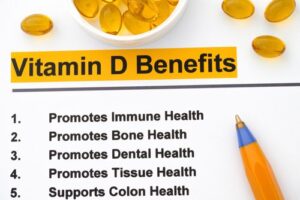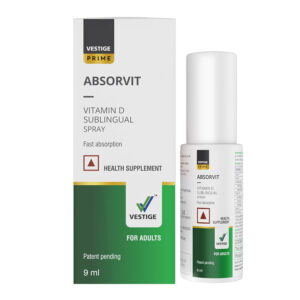Introduction
Vitamins are important ingredients our bodies need to stay in good shape. One of these important vitamins is Vitamin D, which we sometimes call the “sunshine vitamin” because our skin can make it when it gets sunlight. In this article, we’ll learn about why Vitamin D is so important, where we can find it, why it’s a problem if we don’t get enough, how much we should have each day, the risks of not having enough, and ways to get it. We’ll also discuss the best Vitamin D supplements in the form of tablets and sublingual sprays.
What is Vitamin D?
Vitamin D, also known as “calciferol,” is a fat-soluble vitamin. There are different types of vitamin D, like vitamin D2 and vitamin D3. Interestingly, it’s not exactly a vitamin, rather it’s considered a hormone. It helps our body absorb important minerals like calcium, magnesium, and phosphate in our intestines. We can find vitamin D in things like fish, eggs, fortified milk etc. It is also obtained from sun exposure and dietary supplements. When our skin gets sunlight, our body makes vitamin D on its own. It stores this vitamin D in fat and uses it when there’s not enough sunlight around. This makes it quite unique.
Difference between Vitamin D2 and Vitamin D3
Vitamin D has two main types, D2 and D3, which work similarly. When you consume them in food or supplements, your body absorbs them in the small intestine. They move through the intestine and use specific proteins in the intestinal membrane to help absorption. Having fat in your meal aids better absorption of vitamin D, but even without fat, your body can still absorb some. Ageing or being overweight does not significantly change how your body absorbs vitamin D from your gut.
Sources of Vitamin D
We get Vitamin D naturally or supplementary by the following:
Sunlight
One of the primary sources of Vitamin D is the sun. When our skin is exposed to ultraviolet B (UVB) rays from sunlight, it can synthesize Vitamin D. This is why it’s often referred to as the “sunshine vitamin.” Spending some time outdoors, especially during the sunniest parts of the day, can help our bodies produce the Vitamin D we need.
Diet
While sunlight is a significant source of Vitamin D, it’s not always possible to rely solely on sun exposure, especially in regions with limited sunlight. Many foods are also good sources of Vitamin D. These include:
- Fatty Fish: Fish like salmon, mackerel, and sardines are rich in Vitamin D.
- Egg Yolks: The yolks of eggs contain Vitamin D.
- Mushrooms: Some types of mushrooms, like shiitake mushrooms, can provide Vitamin D.
- Fortified Foods: Many foods are fortified with Vitamin D, such as dairy products, orange juice, and breakfast cereals.
Supplements
In some cases, getting enough Vitamin D from sunlight and diet may be challenging. In such situations, supplements can be recommended by a healthcare professional. These supplements come in various forms, including pills and sublingual sprays, and can help meet the body’s Vitamin D requirements.
Benefits of Vitamin D
Vitamin D plays a crucial role in our overall health. Here are some of its essential functions:

-
Reduction in Inflammation
some studies suggest that vitamin D can help reduce inflammation in the body. Inflammation is when the body gets swollen and irritated. Vitamin D3 may be an important regulator of the body’s inflammatory response and so, without sufficient levels of it, inflammation becomes harder to control. It is thought that vitamin D works to regulate cytokines and TNF (tumour necrosis factor), both of which are small proteins involved in inflammation.
-
Heart Health
The evidence indicates that Vitamin D might contribute to maintaining a healthy cardiovascular system. It is believed to play a part in controlling blood pressure and lowering the chances of developing heart disease. Researchers are delving into the intricate ways in which Vitamin D interacts with the cardiovascular system to better understand and potentially harness its benefits for heart health.
-
Bone Health
Vitamin D is crucial for strong bones and teeth as it aids in the absorption of calcium. When there’s a shortage of Vitamin D, the body can’t efficiently use calcium, increasing the risk of conditions like osteoporosis, osteomalacia, and rickets. This can make bones fragile and more susceptible to fractures.
-
Cancer Prevention
Scientists are actively exploring the role of Vitamin D in possibly preventing specific cancers like breast, colon, and prostate cancer. Although the findings aren’t definitive yet, it’s an intriguing and promising field of research. The hope is that as more studies unfold, we might gain clearer insights into the potential cancer-preventive properties of Vitamin D.
-
Immune System Support
Vitamin D is not just a sunshine vitamin; it’s a defender too. It lends a hand to the immune system, making sure it’s up and ready to tackle infections and diseases by boosting the performance of immune cells. Studies hint that a lack of Vitamin D might raise the likelihood of infections and autoimmune diseases, underscoring its importance in keeping our immune defences robust.
-
Multiple sclerosis
MS is a central nervous system (CNS) autoimmune disease that harms the protective myelin sheath around nerve cells in the brain and spinal cord. This damage disrupts communication between the brain and body, causing symptoms like vision loss, weakness, stiffness, poor muscle control, tremors, sensory loss etc. In advanced stages of MS, individuals may lose their capacity to write, speak, or walk.
-
Diabetes
Vitamin D plays a significant role in how our bodies handle glucose. It encourages the pancreas to release insulin and helps the muscles and liver respond better. This vitamin might have a role in how type 2 diabetes develops, affecting glucose processing, and insulin signals, reducing inflammation, and enhancing the function of pancreatic beta cells.
-
Cardiovascular disease
Vitamin D plays a role in regulating blood pressure through the renin-angiotensin-aldosterone system, controlling vascular cell growth, and managing inflammatory and fibrotic pathways. When there’s a lack of vitamin D, it’s linked to issues like vascular dysfunction, stiff arteries, enlarged left ventricle, and high lipid levels, all of which are associated with heart health and the risk of cardiovascular disease (CVD).
-
Mood Regulation
There’s emerging evidence suggesting a connection between low levels of Vitamin D and mood disorders such as depression. Although researchers are still unravelling the precise nature of this relationship, it’s evident that Vitamin D plays a role in influencing our mental well-being.
-
Other Autoimmune Conditions
In a big study called the VITAL trial with over 25,000 people aged 50 and older, taking vitamin D supplements for five years, or vitamin D with omega-3 fatty acids, lowered the chances of getting autoimmune diseases by about 22%. They looked at conditions like rheumatoid arthritis, psoriasis, polymyalgia rheumatica, and autoimmune thyroid diseases.
-
Weight loss
Studies show that people with higher body weights often have lower levels of vitamin D, and those with obesity often have insufficient vitamin D levels. However, experiments don’t confirm a direct cause-and-effect link between vitamin D and weight loss.
-
Flu and the Common Cold
In winter, the flu virus is most active, but it calms down in the summer. A British doctor thought sunlight might have something to do with it over 20 years ago, and now some scientists are saying that vitamin D, which comes from sunlight, might be the reason behind the seasonal pattern of flu outbreaks.
-
Depression
Vitamin D plays an important role in different brain functions, with receptors found on neurons and glia in areas associated with depression. A review of 14 studies involving 31,424 adults found a link between low levels of 25(OH)D and depression.
-
Tuberculosis
In the past, sunlight was used to treat tuberculosis (TB) before antibiotics. Now, recent research hints at a connection between the “sunshine vitamin” (vitamin D) and TB risk. When looking at various studies together, it seems that people with lower vitamin D levels are more likely to get TB. However, these studies don’t show if vitamin D deficiency causes TB or if taking vitamin D supplements prevents it. However, more research is needed to understand these connections better.
What happens when we do not get enough Vitamin D?
Vitamin D deficiency can lead to various health issues, and it’s more common than you might think. Vitamin D is important for keeping us healthy and making our bones strong. It does this by helping our bodies take in calcium and phosphorous from the food we eat and any supplements we might take. Vitamin D can also help protect us from heart problems, high blood pressure, diabetes, infections, and issues with our immune system. It may even reduce the risk of certain cancers (like colon, breast, and prostate cancer) and a disease called multiple sclerosis (MS).
Some consequences of Vitamin D deficiency include:”
-
Rickets: When kids don’t get enough Vitamin D, they can get a sickness called rickets. Rickets makes their bones weak, crooked, and can slow down how they grow. It’s painful and can affect them for a long time.
-
Osteomalacia: Adults with a lack of Vitamin D can develop a condition called osteomalacia. It makes their bones soft and weak. This can lead to bone pain, weak muscles, and a higher chance of getting bone fractures.
-
More Likely to Get Sick: Vitamin D is important for a strong immune system. If you don’t have enough, you can get sick more easily, especially with things like the flu and the common cold.
-
Feeling Tired and Weak: Not having enough Vitamin D can make you tired, weak, and have sore muscles. It becomes harder to do your daily tasks.
-
Mood Problems: A lack of Vitamin D has been linked to feeling sad or having mood issues like depression and something called seasonal affective disorder (SAD).
Who is at risk of Vitamin D deficiency?
Certain groups of people are more vulnerable to Vitamin D deficiency:
1. Those with Limited Sun Exposure
People who spend most of their time indoors, cover their skin for religious or cultural reasons, or live in regions with limited sunlight are at a higher risk of deficiency.
2. Dark-Skinned Individuals
Melanin, the pigment responsible for skin colour, reduces the skin’s ability to produce Vitamin D in response to sunlight. Dark-skinned individuals, therefore, may need more sun exposure to produce an adequate amount of Vitamin D.
3. Older Adults
As people age, their skin becomes less efficient at producing Vitamin D, and their kidneys may not convert it into its active form as effectively. This puts older adults at a greater risk of deficiency.
4. People with Certain Medical Conditions
Some medical conditions, such as celiac disease, Crohn’s disease, and obesity, can interfere with the absorption of Vitamin D.
What are the symptoms of excessive Vitamin D?
Symptoms of excessive vitamin D include headaches, nausea, loss of appetite, dry mouth, vomiting, constipation, and diarrhoea. When choosing supplements, caution is advised, as the FDA does not monitor their safety and purity as rigorously as pharmaceuticals. Maintaining a balanced diet with diverse nutrients is crucial for overall health and disease prevention, emphasizing the importance of a well-rounded eating pattern over excessive focus on specific nutrients.
What are the symptoms of Vitamin D deficiency?
Most people with a lack of vitamin D don’t show symptoms. Yet, a long-term shortage can cause problems like low calcium levels and hormone imbalances. These can lead to issues like fragile bones, pain, fatigue, and muscle weakness. Suppose the deficiency persists for a long period. In that case, it might lead to more serious complications like heart problems, autoimmune issues, neurological diseases, infections, trouble during pregnancy, and some types of cancer, like breast, prostate, and colon cancers.
How much Vitamin D is required daily?
The right amount of Vitamin D to take differs based on age and such. According to the Institute of Medicine, here’s a general idea:
- For babies (up to 1 year): 400-1,000 IU (10-25 mcg)
- Kids (1-18 years): 600-1,000 IU (15-25 mcg)
- Grown-ups (19-70 years): 600-800 IU (15-20 mcg)
- Adults above 70 years: 800-1,000 IU (20-25 mcg)
Remember, everyone’s needs might be different. It’s better to talk to a healthcare provider for personalized advice.
How to prevent Vitamin D deficiency?
Some individuals might need more vitamin D, like older adults, breastfed babies, and those with dark skin or vitamin D deficiency. To fix a shortage, people often take vitamin D supplements. If we don’t get much sun or we’re over 65, we might lack vitamin D. Some use it for bone problems, heart disease, asthma, and more, but there’s no strong proof for these uses. However, keeping a good amount of vitamin D is always essential for our health.
Vestige Vitamin D Sublingual spray
Vestige Prime Absorvit Vitamin D Sublingual spray is an innovative dosage form that improves the traditional method of taking vitamins. It assists in the rapid absorption of nutrients into the bloodstream. This product is particularly suitable for individuals who have difficulty swallowing pills. It also supports immune function and helps regulate the absorption of calcium and phosphorus, promoting healthy bone development. Additionally, it has anti-inflammatory properties.

Product Details
Name: Vestige Prime Absorvit Vitamin D Sublingual Spray
Form: Liquid (Spray)
Net Content: 9 ml
Shelf Life: Best before 24 months
Country of origin: India
Company: Vestige Marketing Private Limited, Okhla, New Delhi
Dosage
The recommended dosage is just one spray per day.
Conclusion
Vitamin D, “the sunshine vitamin”, is a crucial nutrient for maintaining overall health. It plays a vital role in bone health, immune system support, and much more. A deficiency in Vitamin D can lead to various health issues, so it’s important to ensure we get an adequate amount of this essential vitamin through sun exposure, diet, and, if necessary, supplements. Taking care of our Vitamin D levels can go a long way in promoting a healthier and happier life.
Legal Disclaimer
The information on this website is for learning purposes only and is not a replacement for medical advice from a healthcare professional. Since everyone’s needs are different, it’s important to consult with your doctor to see if the information here is suitable for your situation.
Suppliers who list their products on healwellbeauty.com are responsible for making sure the product information is accurate. You should use these products in a safe and lawful way and avoid any illegal activities. The actual product packaging, materials, and design might have more or different details compared to what’s shown here, including things like nutritional information, statements, usage instructions, warnings, and disclaimers.
We recommend reading the product label before using or consuming any products and not relying solely on the information provided on healwellbeauty.com. Before you make any changes to your healthcare plan or treatment, like starting, stopping, or altering anything that your doctor has recommended, it’s important to have a conversation with your doctor or healthcare professional. They can help you figure out the best therapy or course of action for your specific needs. We are not responsible for any side effects, losses, claims, damages, or injuries that might occur from the improper or illegal use of products sold by our suppliers on healwellbeauty.com.
© 2023 healwellbeauty.com All Rights Reserved. Unauthorized reproduction, distribution, or use of this content is prohibited.
Resources/References
- Wikipedia: https://en.wikipedia.org/wiki/Vitamin_D
- https://www.nationwidechildrens.org/conditions/vitamin-d-deficiency
- https://www.hsph.harvard.edu/nutritionsource/vitamin-d/
- https://ods.od.nih.gov/factsheets/VitaminD-Consumer/

Leave a Reply